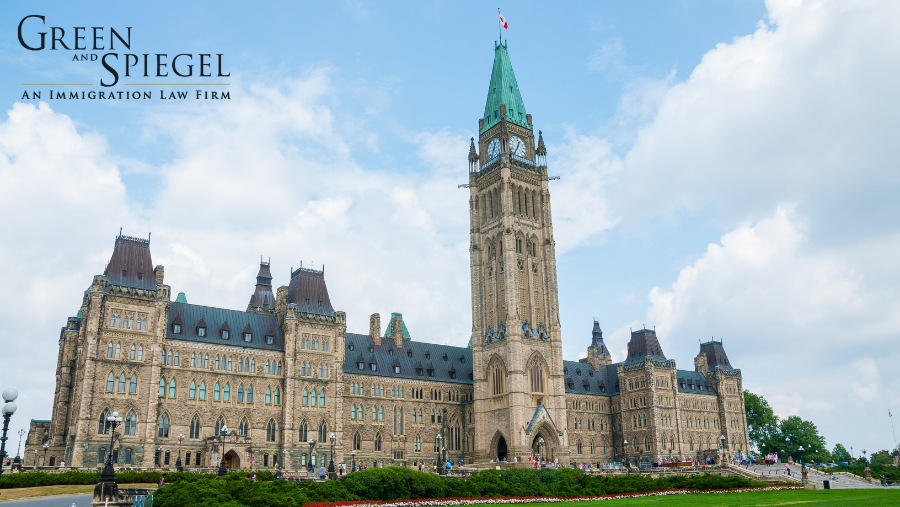Here are 5 frequently asked questions we, at Green and Spiegel, get about the residency obligation:
1. What is my residency obligation as a permanent resident of Canada?
Under section 28 of the Immigration and Refugee Protection Act, permanent residents must comply with a residency obligation with respect to every 5-year period.
Usually, the residency obligation is met by spending a total of 730 days (2 years) inside Canada in the 5-year period immediately before examination. If you are outside of Canada, you can still meet your residency requirement if you fall into one of these categories, among others:
- You are accompanying a Canadian citizen spouse or parent (in the case of children) outside of Canada;
- You work outside of Canada on a full-time basis for a Canadian business or the Canadian provincial, territorial, or federal governments;
- You are accompanying a permanent resident spouse or parent (in the case of children) who works outside of Canada on a full-time basis for a Canadian business or the Canadian provincial, territorial, or federal governments;
Importantly, even if you have breached your residency obligation, an officer may allow you to retain your status based on humanitarian and compassionate considerations.
2. When does my residency obligation get assessed?
A decision-maker will inquire into your residency obligation every time you renew your permanent resident card or apply for a permanent resident travel document. Moreover, your residency obligation may be assessed when you present yourself at the Canadian border. Even if you have been living outside of Canada for many years, you do not lose your permanent resident status until a decision-maker makes a final decision to revoke your status.
3. Do I lose my permanent resident status when my permanent resident card expires?
No. You do not lose your status when your permanent resident card (“PRC”) expires. A PRC is simply the identity document that verifies your status as a permanent resident and enables you to enter Canada in a commercial vehicle, such as an airplane.
4. What happens if my permanent resident card expires while I am travelling outside of Canada?
If you are travelling to Canada by commercial vehicle (plane, train, bus, etc.), you must show a valid PRC to re-enter the country. For this reason, it is always a good idea to check the expiry date on your card before you leave Canada. However, if you do find yourself outside of Canada with an expired PRC, you have two options.
The first option is for you to apply for a permanent resident travel document (“PRTD”) at a Canadian visa post abroad. When you file this application, Immigration, Refugees, and Citizenship Canada (“IRCC”) will conduct an assessment to determine whether you have met your residency obligation. If IRCC concludes that you did not meet your residency obligation, your permanent resident status may be revoked.
The second option is for you to come back to Canada by private vehicle (this is a car, truck, motorcycle, or other vehicle that you own, borrow, or rent). However, you will need to demonstrate to the border officer, through alternative documentation (for example, your confirmation of permanent residence document), that you are a permanent resident of Canada. Entering Canada in a private vehicle may lead to an assessment of your residency obligation, but the officer cannot refuse a permanent resident entry into the country.
5. What are my options if an officer determines that I have not met my residency obligation?
If a decision-maker determines that you have not met your residency obligation and revokes your status, you may apply to the Immigration Appeal Division (“IAD”) for an appeal. Permanent residents must be mindful that their appeal rights expire: if the decision to revoke your status was made outside of Canada, the Notice of Appeal must be provided to the IAD no later than 60 days after you receive your written decision. If the decision was made at an examination inside Canada, the Notice of Appeal must be provided to the IAD no later than 30 days after you receive the removal order.
At the IAD, you will be given a full hearing before a Panel Member. Crucially, even if you are found not to have met the residency obligation, the IAD may still allow you to keep your status if there are sufficient humanitarian and compassionate grounds. For example, the IAD will evaluate to what extent you fell short from complying with your residency obligation; your reasons for being away from Canada; your establishment in Canada; your family ties in Canada; and, the hardship that you would face if you lose your status.
This is a complicated area of Canadian immigration law. It is highly recommended that you seek legal assistance as soon as you confront an issue with your permanent resident status. If you have further questions, please contact us directly.




